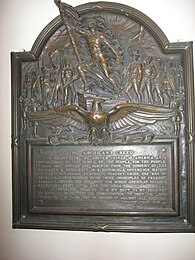American Creed
This article has multiple issues. Please help improve it or discuss these issues on the talk page. (Learn how and when to remove these messages)
|
The American Creed is a term used to refer to the idea that the defining element of American identity, first formulated by Thomas Jefferson and elaborated by many others,[1] includes liberty, equality, justice, and humanity.
The American's Creed (resolution)
[edit]
"The American's Creed" is the title of a resolution passed by the U.S. House of Representatives on April 3, 1918. It is a statement written in 1917 by William Tyler Page as an entry into a patriotic contest that he won.
I believe in the United States of America, as a government of the people, by the people, for the people; whose just powers are derived from the consent of the governed; a democracy in a republic; a sovereign Nation of many sovereign States; a perfect union, one and inseparable; established upon those principles of freedom, equality, justice, and humanity for which American patriots sacrificed their lives and fortunes. I therefore believe it is my duty to my country to love it, to support its Constitution, to obey its laws, to respect its flag, and to defend it against all enemies.
— William Tyler Page, The American's Creed, [2]
See also
[edit]- List of U.S. national symbols
- American civil religion
- American exceptionalism
- American nationalism
- Americanism (ideology)
References
[edit]- ^ Huntington, Samuel (2004). Who are we?: The challenges to America's national identity. Simon & Schuster. p. xv. ISBN 0-684-87053-3.
- ^ "The American's Creed". UShistory.org (Primary source). February 4, 2020 [1917]. Archived from the original on April 1, 2020. Retrieved August 3, 2020.
Further reading
[edit]- Murdock, Myrtle Cheney (1958), The American's Creed and William Tyler Page, Monumental Press. ISBN 978-1258318864
- Page, William Tyler (1921), The Book of the American's Creed, Sons of the American Revolution: The Country Life Press. OCLC 4783599
